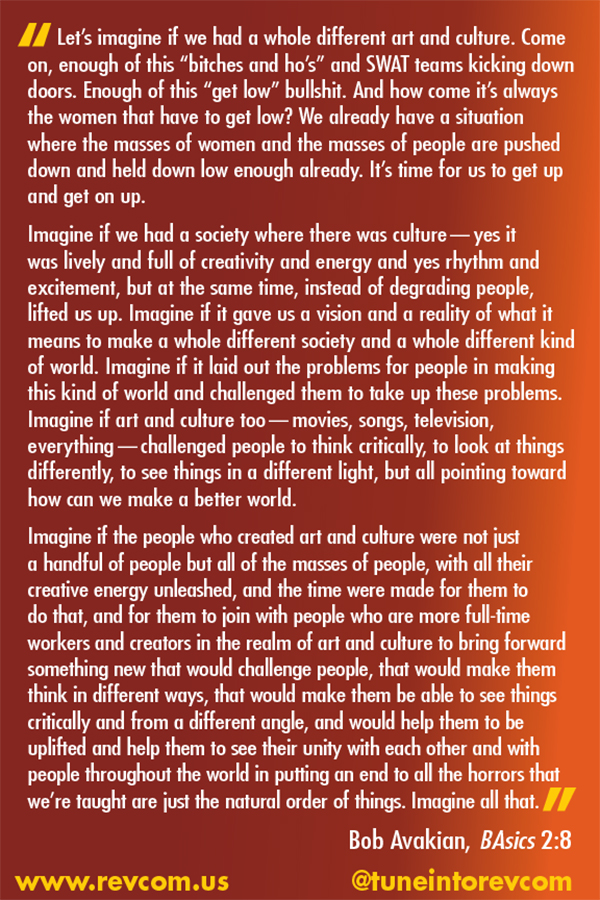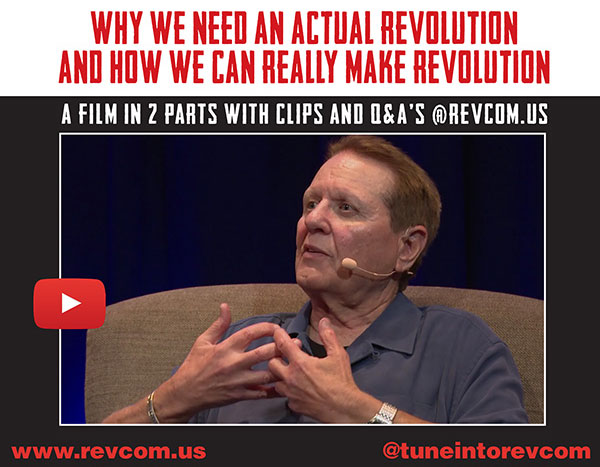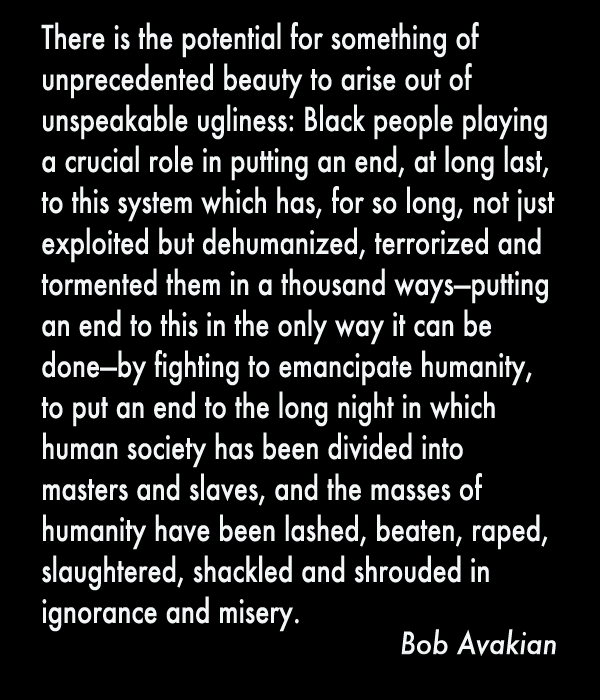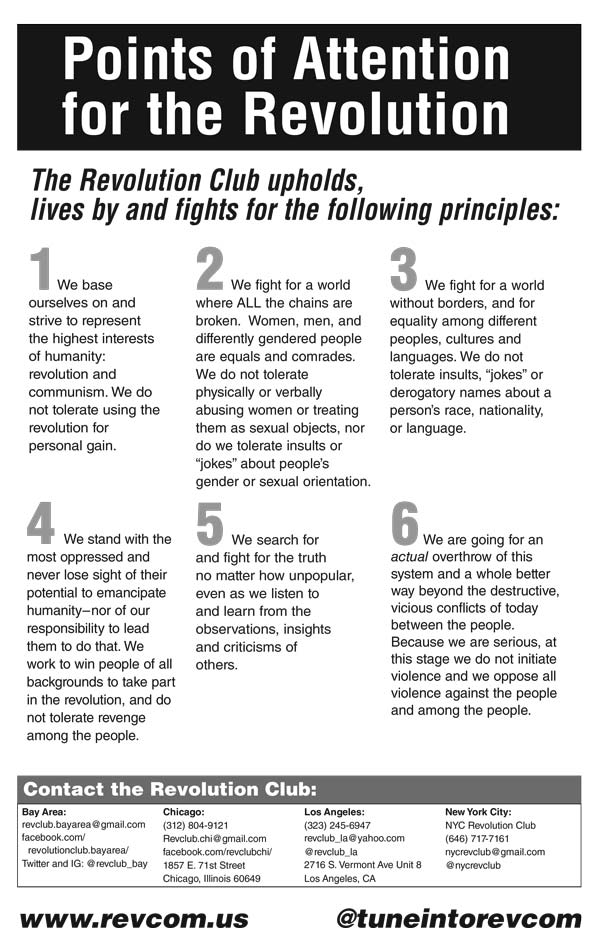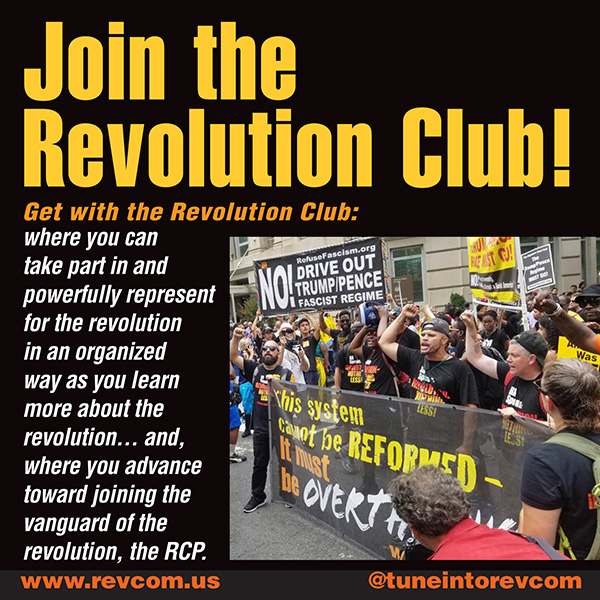Queen & Slim: Vignettes and Reflections
by a member of the Revolution Club, Chicago
| revcom.us
Editors’ note: The Revolution Club welcomes discussion and debate on culture to change the world. Write us.
I am not a fan of love stories. The romance genre is plagued with toxicity like none other. In most movies I happened to see, stories I’ve been told, and observations amongst many people I see, true and genuine healthy love is extremely rare, and even more so the two in a relationship maintaining independent identities is rarely heard of. For this reason—along with the patriarchal binaries, shameless consumer relations and degrading, jarring sex—I had mostly decided the genre had no redeeming qualities.
Or so I thought. Spoilers ahead.
Queen & Slim is a story of two people that grew up in each other’s vicinity but took two very different paths as they grew up. Queen’s an attorney now and Slim I’m not sure of, but it sounds like there is a possibility he didn’t have as much schooling.
After a Tinder date where the two could be no farther apart, a police officer stops them for a traffic violation. He breaks several laws to find something to pin on Slim despite Slim’s cooperation. Angry at the clear violation of Slim’s rights, Queen calls out the pig, but as soon as she steps out of the car she gets shot in the leg, leading to a life-or-death wrestle that puts the pig’s gun in Slim’s hands, shooting to stop the rabid cop in their defense.
After a Thelma and Louise-like adventure ensues (I had originally put Bonnie and Clyde, but after comparing the two references and the fact Queen and Slim were not wrong, I chose another righteous pair), helping them grow as people and as conscious choosers of their lives. They learn from everyone they meet, whether they root for the two or disagree, but do not act in ways that hurt the pair. Till a Judas-like betrayal happens.
My favorite scene is a hard choice between the sex/protest and ending.
The “sex/protest scene” features a back-and-forth cutting between a righteous protest taking up the cause of Queen and Slim and against police murder, and Queen and Slim’s first time making love. It is not only built upon and stylized in a way where you feel like you are there, embracing the feelings of compassion of the two and the passionate, righteous rage of the people, but it marks a turning point.
Up until then, despite the death of the pig being unplanned, the removing of the sheriff as an active hostile force, the encouragement and happiness of a Dad and Son who even ask if they did this as a part of something larger for “the people,” or even the Uncle (Bokeem Woodbine) actually acting outside of the caustic role of a pimp to help the fugitives escape to the East Coast... up until this point the reason they had run away was to purely survive. Queen knew from experience in the injustice center as a lawyer just how cruel the courts can be. (Ironically this is how they first meet, when she takes him as a Tinder date to cope with the impending death of a client and just to be around someone.) The teen son of the mechanic who fixes their car helps pull back the lens to show them a larger context in which their actions take place and the larger ramifications of the choices they have made. He beams at their courage and chatters about how inspirational they are, and how kids and people like him support and wish to embolden the need for actual change simply put as, Stop fucking killing us!
To go back to the Bokeem Woodbine character a minute, to draw out an important point in the movie: Queen makes a very important, hard decision that truly shows her character as a person to legally defend her uncle for accidentally killing her mother. She’s angered at what happened, but the insistence to do what was right because she knew it wasn’t on purpose is a decision many would find hard to come to. It’s a stark contrast with the revenge-blazed retribution that has too much plagued the “me too” movement. How can someone change the arc of their life except when given a chance? This is why Point of Attention #4 not only stresses never losing sight of the potential of the masses caught up in the system game today, but stresses the need to take up leadership in making that happen. Through example, when the rubber hits the road, Queen knew what was true and worth standing up for, even if it pained her to think of what happened.
We see for the first time more of a reaction of the masses outside of those directly in contact with the pair. The way their actions have taken flight and inspired an adamant demanding of humanity. In a way, Queen and Slim finally give in to giving each other a chance and enter into something new and uncharted, of caring about each other more than as just passing friends. It’s a budding of love onscreen.
Meanwhile, the protest heats up at the beginning as a standoff between the people and the forces of repression that wish to quell their anger into manageable pieces. They yell passionately in the faces of the armored pigs as the pigs incite confusion by throwing distractions into the crowd, causing them to temporarily disperse some and the order to leave is called. Your heart burns with the young man’s. The hate of the denial of life by this system is concentrated in the yells challenging them to take him on, daring them to do what they do best: Kill People. It was gut-wrenching watching him pull the trigger at point blank on the pig. He had so much insight and potential. But it was snubbed early by brash actions.
A Heavy But Relatable Thought
In one of the scenes leading up to this crescendo, as we go back to the teenager’s meeting Queen and Slim, we hear about the concept of “Immortality” and what is worth fighting to live for. They are honestly shocked at the way the teenager has already accepted that he won’t live long. The revelation gives the pair strength to fight on. The teen wants his life to contribute to a future where this kind of bloody oppression doesn’t go on.
It’s a heavy but very relatable thought. After seeing the videos after videos after videos in 2015, I came to a similar thought-path upon realizing my own mortality in a way that wasn’t just fear or resignation. As a Black person in this society, you grow up getting taught by peers (Black or not) that your life could be easily snuffed out as your ancestors before you did. The world chooses your “destiny” for you, which you must accept and find a way in the boundaries of oppression to survive.
This looming death sentence only got intensified when the role of the police was made more and more apparent. Vic Mensa crystallizes the raw anger and fightback in his song “16 Shots.” The lyrics make you feel the anger course through your veins but its solution is by no means what we need. Struggle and great timing led me to making the decision, when it was presented, of an alternate, far better world that we can go to work on Now—through Revolution.
The difference between myself and the teenager is that I happened to run into real revolutionary leadership and took up its aims and goals. Not the pent-up, loose-cannon frustration that may feel good now but either you won’t be alive to help anyone and it takes away from why you did it. Point of Attention #6 of the Revolution clearly opposes such action: “We are going for an actual overthrow of this system and a whole better way beyond the destructive, vicious conflicts of today between the people. Because we are serious, at this stage we do not initiate violence and we oppose all violence against the people and among the people.” But let’s get into what the first part of POA 6 even means and what context it’s in.
What I had that the young man in the film didn’t was an introduction to Bob Avakian (BA) and collective vanguard force that took the responsibility to lead me through a process of taking up and wielding the New Communism BA has brought forward. It’s a priceless and crucial step in making the leap from just a concerned angry person—depressed at the state of the world, aimlessly throwing fists at the wind or wrong enemy—to a part of a collective juggernaut that could upend all relations of oppression and lead a process of eternally changing humanity and the planet. Avakian has spent decades even while under heavy blowback from the state, like wanting to sentence him to 240 years, lies and slanders so old and so tired they’d shrivel the paper you wrote them on and heavy misinformation and outright distortion about the vanguard he leads and the path for emancipation he resituated and furthered. Capitalism-imperialism is the system that currently holds global Dictatorship in most 1st world countries and influences the livelihoods of everyone on the planet. It dominates and dictates how countries respond to each other to what makes a child a child, as in the literal denial of childhood in many countries due to child labor, sex trade/human trafficking, child soldiers, and mass displacement by war or climate even here in the detention centers to across the world. The goal of the new communism is to overcome and get beyond all systems of governing, relations, and ideas that are meant to oppress people of any kind over another.
In the movie, the aim is to live the best life you can while you have it, possibly even while under fire. But this is not YOLO [You Only Live Once]—this is about making every moment count and actually opens up the question of what is truly worth living for. Characters that were about only themselves became about something a bit more. It invites Black people to loosen the load of centuries of oppression and straighten their backs a little.
But then it stops, abruptly. The smoke clears from Slim’s bullet-riddled body and blood congeals on Queen’s breast. We are given a small view of their immortality, but is it in memorial to them or to stand with them even after death? There isn’t a clear conclusion but a shaking head moment of “Dog-damn, I knew they were going to die. Right when I got my hopes up.” The theatre I went to both times in two different states left somber. Like we dared to hope, and they were dashed once again.
The ending was complex and multi-faceted. I think it would be a lot to get it all down here and currently I think other aspects of reality need more of my attention than this piece of art alone.
Queen and Slim as a dreamscape
On watching the film a second time. The anxious on edge feelings of “please, please, please survive” is quieted as one accepts their impending death. 6 days. 6 days that changed everything. I was able to feel and look at scenes I had watched previously with love brimming and tears spilling just being there.
Queen and Slim had died from the moment they were in the encounter with the police officer. Every moment afterward was like a “what if?” in a journey that took them into an introspection beyond the superficial world. They were able to look at other people in the world—as the tongs heated up everyone had a choice about what to do with their volatility. And in this peak moment what would you do if confronted by xyz?
It celebrated life. Not in a caustic sense but one that emphasized the will to live.
Now the movie is superb, but it’s not flawless. The tendencies of the Black pig being the good pig, embracing destiny and god, as well as the complicated pimp of an uncle Queen has, are definitely not to be stepped over. But I think the question is posed sharply of what is truly worth living for and dying for. Once that comes to light, it deepens then what is required of us, which is batted around in different ways. The Pimp acts outside his own outlook to help the fugitives find refuge—giving them money, a car and clothes due to Queen’s insistence of coming through for her. The wife of the military vet that served in Iraq too, could have easily called the police or ratted them out, but she gets won to a point of not agreeing with them or what they did but not giving them away. There are many more guests that appear, but for the time being I mentioned these two. It’s almost like a quick run-through of different levels and types of people that need to be won over to the cause of revolution as it gets closer to a revolutionary situation. The friendly neutrals, those that deny intelligence to the enemy, those that wish to align and may carry out something in the name of revolution that does not reflect its strategy, those that may not be the most versed in what the new communism is but know who BA is and how to project what he’s leading forward as they learn more.
Another thing not to step over in the movie was the need for human contact. Sounds vague, right? Humans are social creatures and need relationships of all types. The fact that Queen and Slim met through Tinder is so relatable. The generation that I come from—being born in the nineties and after in the age of the internet—has actually been robbed in some ways of communicating with one another in person. Everything is filtered through crass property relations and measured with the same ruler. It’s like who has the biggest wedding ring to show off and at every moment you meet someone you have to compare rings with before speaking. “Can you give me what I want” is another part that corrupts even the most ground-breaking relations between people and the need to feel like “your investment is being returned.” This isn’t quite the same age as going to the aquarium to meet people and hang out. The focus on constantly honing your brand takes away from any enjoyment. Getting to know one another and even having arguments like the main characters do is seen as personal attacks and probing interrogations replace getting to know each other.
And shout-out to Angel1 (Indya Moore), love how the director and writers let her be a character not defined by transitioning but by her as a person. You don’t see non-binary people, whose gender is not directly correspondent with their sex, in roles where they are who they are.
1. I am referring to Moore’s character in Pose, the very well done FX show. It’s a very visceral introspection of what it means to live while the AIDS crisis is in full swing.
Get a free email subscription to revcom.us:


